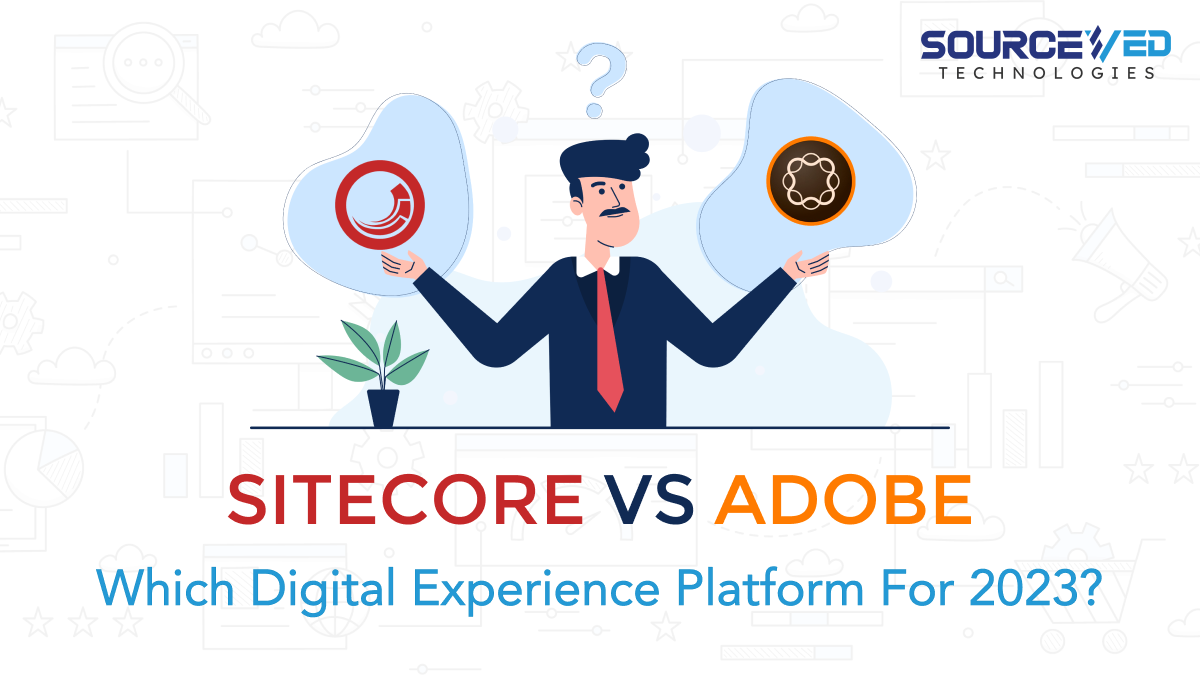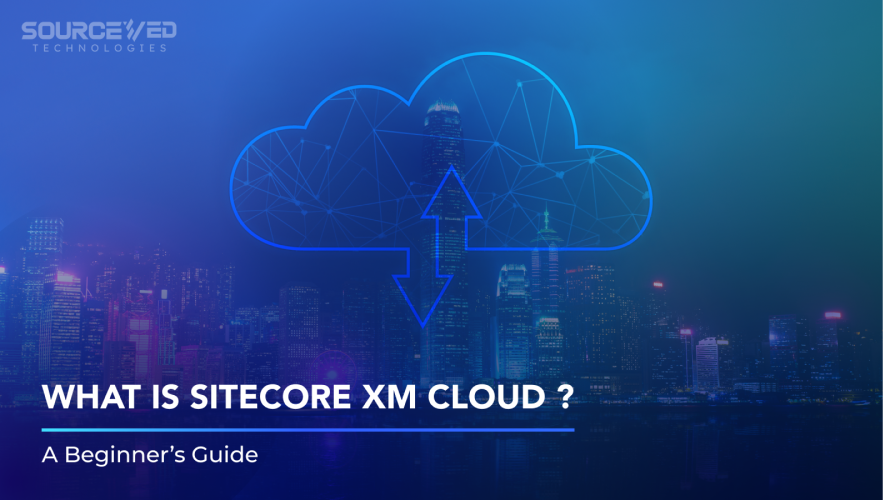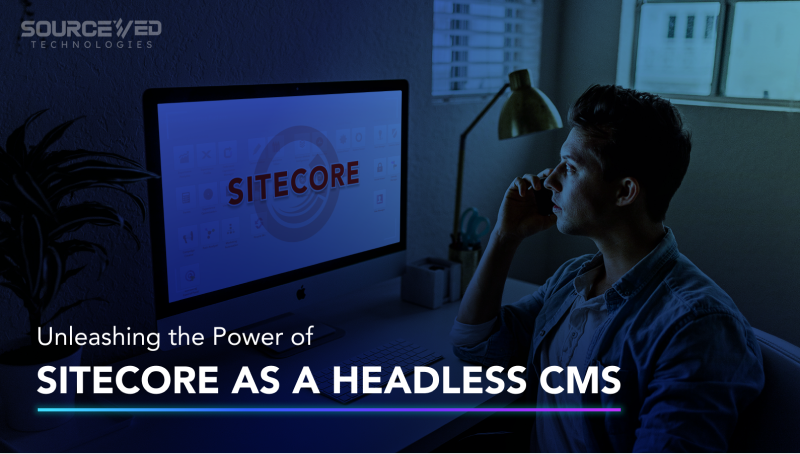
Choosing the right digital experience platform is crucial for prioritizing customer satisfaction in business. Sitecore and Adobe offer excellent tools for managing website content, marketing, and digital customer experiences.
Check out the blog to understand the detailed features, pros, and cons of these technologies and make a well-informed decision.
Introduction:
Understanding Sitecore:
Sitecore is an enterprise-grade digital experience platform developed in 2001 as a content management system (CMS). The CMS offers a suite of tools enabling businesses to manage content, eCommerce, marketing, and customer experience efficiently.
It is developed using .NET and works well with all Microsoft technologies. The platform allows easy integration with third-party software using APIs.
Sitecore provides a comprehensive suite of tools and products designed to enhance various aspects of digital experience management:
1. Sitecore Experience Platform (XP)
– Empowers businesses to efficiently manage content.
– Leverages AI for marketing automation, leading to higher conversion rates.
2. Sitecore Experience Commerce (XC)
– Equips businesses with tools to create fully personalized end-to-end shopping experiences for customers.
3. Sitecore Content Hub
– Enables centralized control and management of marketing content across all channels through a single, integrated solution.
4. Sitecore Experience Manager (XM)
– A proven solution for seamless omnichannel content management.
– Facilitates businesses in managing and editing pages and content.
– Sitecore introduced Sitecore Experience Manager (XM) Cloud in 2022 as an enhanced version of Sitecore XM.
Businesses can opt to use each of these tools individually to address specific needs. However, they are designed for easy integration, providing a comprehensive package for seamless business management and growth.
Understanding Adobe:
Adobe Experience Cloud is a robust digital experience platform developed by Adobe Inc., formerly known as Adobe Marketing Cloud (AMC). This end-to-end solution provides businesses with a comprehensive set of tools to deliver superior customer experiences.
It Offers a range of tools and components is available:
1. Adobe Experience Manager
– Enables businesses to efficiently manage and edit content and digital assets, facilitating personalized experiences.
2. Adobe Campaign
– Serves as Adobe’s marketing solution, empowering businesses to craft tailored content for a seamless omnichannel presence.
3. Adobe Audience Manager
– Functions as a data management platform (DMP), supporting personalized marketing through data analytics, automation, and strategic audience building.
– Offers robust security measures and support for reliable audience reach.
4. Adobe Advertising Cloud
– A programmatic advertising platform that provides comprehensive tools for managing online advertising across all channels.
5. Adobe Target
– A component of Adobe Experience Cloud, it offers tools to optimize and personalize customer experiences, contributing to increased revenue across all channels.
6. Adobe Analytics
– Delivers in-depth analytics, predictive intelligence, and reporting for various stages in the customer journey.
– The insights into customer data and business status facilitate informed decision-making and improvements.
7. Market Engage
– A marketing automation software designed to help organizations automate marketing activities, streamline lead management, and enhance cross-channel engagement.
– Assists in evaluating the value of each touchpoint converted throughout the customer journey.
Why Enterprises opt for Sitecore?
- Consistency and Collaboration: Sitecore enables marketers and IT to collaborate seamlessly to create, optimize, and deliver consistent digital experiences.
- Sitecore AI: With Sitecore AI, companies can identify trends, and customer preferences to segment customers and deliver better experiences.
- Centralized Content Hub: Sitecore’s Content Hub helps marketers manage, edit, and optimize all content assets across all platforms like websites, eCommerce, and more.
- Extensive support system: Sitecore has a comprehensive support system, including a knowledge base, online communities, and an expert development team.
Why Enterprises opt for Adobe Experience Manager?
- User-friendly CMS: Adobe offers a user-friendly interface, intuitive inline features, drag-and-drop functionality, and content authoring functionalities to increase CMS productivity.
- Content-driven & personalized experiences: Adobe Experience Manager helps companies deliver tailored customer experiences. Companies can integrate Adobe Target and Adobe Analytics to provide personalized and tailored shopping experiences for B2C and B2B brands.
- Extensive Adobe products: Adobe offers a comprehensive suite of tools apart from AEM for enterprise use, like Creative Cloud and Adobe Analytics.
- Faster time to market: Adobe Experience Manager makes it easier and quicker to create, manage, and deliver content by reducing complexity in the workflow.
Differences between Adobe and Sitecore
Technical Implementation
Both Sitecore and Adobe offer a suite of tools and features to help businesses automate their activities and accelerate growth. However, are these tools really helping organizations make the most of them? Let’s find out.
Sitecore
Sitecore offers various tools and platforms that are highly integrated and offer technological consistency. All the tools and platforms that Sitecore offers are developed using .NET and the Sitecore Experience Database as the customer data management platform.
All Sitecore tools and platforms can integrate seamlessly through the xConnect service layer. xConnect service layer is the single Sitecore API framework that seamlessly connects Sitecore products and external MarTech systems.
Secondly, web applications developed using Sitecore are highly flexible and adapt to specific business requirements. In addition, Sitecore solutions are highly scalable, making the solution compatible with increased user demands.
Adobe
Contrary to Sitecore, the tools and platforms offered by Adobe could be more consistent and integrated. The numerous solutions that Adobe offers are loosely coupled architectures, languages, APIs, and data management systems.
Since the various solutions are heterogeneous and loosely coupled, companies find it complicated to integrate various solutions. Thus, it increases the complexity and cost of the applications.
Also, the applications are less scalable. Upgrading Adobe to solve the above-mentioned issues is challenging as it requires initial backup, which is another issue.
Verdict
Technical implementation with Sitecore is more streamlined compared to Adobe. Companies need .NET experts to run numerous Sitecore solutions.
On the other hand, with Adobe, companies need developers who have knowledge and expertise in multiple programming languages or development platforms. Developers face many challenges with scaling and upgrading as well.
Sitecore Vs Adobe – Usability
After the technical implementation, the next factor to consider is usability. Let us look at how the various tools offered by Sitecore vs. Adobe make the lives of content managers, publishers, sales managers, and marketers easier.
Sitecore
The user interface offered by Sitecore is unified, consistent, and user-friendly. Secondly, it is easy to manage various Sitecore platforms, and the developers do not need knowledge of many programming languages.
Sitecore platforms enable multiple users to access, share, and manage content and data. Multiple users can access the data at the same time with no compromise to security. Also, the platform can handle multiple users with no drop in speed or performance.
Adobe
Adobe enables businesses to access system components from a single platform. It helps maintain the same look across all parts of the company’s system. Thus, businesses get a more efficient system performance and faster content delivery.
Adobe Solutions offers separate client-side libraries for distributed content management. Multiple teams can work simultaneously on the same data; also, not much training is required to manage different platforms. The user interface is simple and friendly, making it easy to manage content.
Verdict
Both platforms are user-friendly and perform efficiently. They enable easy content management, eCommerce, and marketing automation for faster business growth and expansion.
Sitecore Vs Adobe – End User’s Experience
Sitecore and Adobe both focus on delivering satisfying end-user experiences. Let us dive into the insights on which performs the job better or both perform equally well.
Sitecore
Sitecore is known as a top digital experience platform because of its great features. It helps businesses make users happy.
With Sitecore, businesses can customize content for users’ shopping experiences, making it more likely for users to buy things. Sitecore also lets business owners provide personalized data based on what users like. The platform uses advanced tools to create and deliver content that users want.
Since Sitecore is a headless CMS, business owners can use the same content for multiple channels and platforms with no changes in the backup. Thus, delivering delightful omnichannel experiences becomes easier.
Adobe
Adobe offers many platforms that prioritize satisfying end-user experiences. The powerful AI-based content personalization engine — Adobe Target focuses on the same.
The platform allows businesses to create personalized content for multiple channels for omnichannel presence. In addition, the platform offers reliable A/B and multivariate testing for efficient content delivery and makes scaling easier.
Another powerful tool offered by Adobe is Adobe Sensei. The tool uses machine learning and artificial intelligence best practices for content creation and enhanced targeting.
The tool also offers advanced analytics of cross-channel user data for intelligent decision-making. Thus, organizations can deliver user-specific content based on real-time customer profiles.
Like Sitecore, Adobe also has a headless CMS for delivering content via various channels.
Verdict
Sitecore and Adobe both offer incredible tools and platforms to enable businesses to deliver personalized content and memorable experiences.
Cost
The cost of a digital experience platform is a crucial determinant for companies. The platform must suit their budget. Let us see from Sitecore vs. Adobe which CMS suits your budget.
Sitecore
The software cost varies based on a company’s needs. However, Sitecore is known for its high costs, especially with per-user licensing. This overall expense might be challenging for companies with a broader audience.
Adobe
Adobe comes with an even higher price tag, reaching up to six figures for an average project cost. The commission-based partner ecosystem of Adobe contributes to an increase in project implementation costs.
Verdict
The cost of both Sitecore and Adobe is high, but Sitecore is comparatively less expensive.
Community and Partner Support
Another factor to consider when choosing an ideal digital experience platform is community and partner support. Enterprises want to get the desired return on investments. So, let us look at Sitecore vs. Adobe support systems.
Sitecore
Sitecore simplifies partnerships and user interactions for a better experience. They offer helpful content, tutorials, and support. Sitecore also has a special agreement for support. Users can engage through Sitecore’s active Slack channel with 5,000+ members and a forum with over 1,100 participants.
Adobe
Adobe supports its community with free guides for digital transformation, and users can seek help from their support team. Adobe Experience Manager offers various resources, but the partner network lacks adequate support for developers, impacting end-customer projects negatively.
Verdict
Sitecore offers well-orchestrated partner network support for its customers throughout the project implementation and post-project completion. On the other hand, Adobe offers extensive community support, yet it lacks in offering robust partner network support.
Use Cases
Now we have discussed all the factors that can affect your choice of platform. Now let us look at some use cases for both Sitecore and Adobe.
Sitecore
Sitecore offers all the tools and functionalities to help companies personalize customer experiences. From advanced eCommerce functionality to optimized content and marketing campaigns, Sitecore makes it easy for businesses to attract new customers, retain existing ones, and deliver satisfying experiences.
Companies that deliver products and services to diversified markets can benefit from the personalization tools. However, Sitecore is expensive, and the license cost is too high. Enterprise-level businesses can afford license costs.
Adobe
Adobe has all the solutions to offer for extraordinary marketing and personalization. Yet, Adobe is highly expensive, and this limits its users. Large businesses with diverse customers and many websites can afford Adobe for their digital experience platform.
Let us look at the table-view comparison of Sitecore Vs. Adobe for a 360-degree overview.
Conclusion
Now it’s time for you to decide between Sitecore and Adobe. Which digital experience platform is the right choice for you?
Sitecore and Adobe both offer a lot in common, including advanced personalization, powerful performance, a wide range of tools and functionality, and a high cost.
We have listed all the similarities and differences between the two. Yet, the final choice of the platform will depend on your business requirements and budget.
Companies have to look at their business needs and target audience demands. What is your business priority- whether it is eCommerce, marketing automation, or content personalization?
The choice of the digital experience platform will depend on that.
Sitecore is ideal for extraordinary eCommerce, while Adobe is ideal for marketing automation.
If you still find it hard to make a decision, you can seek professional help. A reliable digital transformation company can help you choose the right platform based on your business needs and budget.


